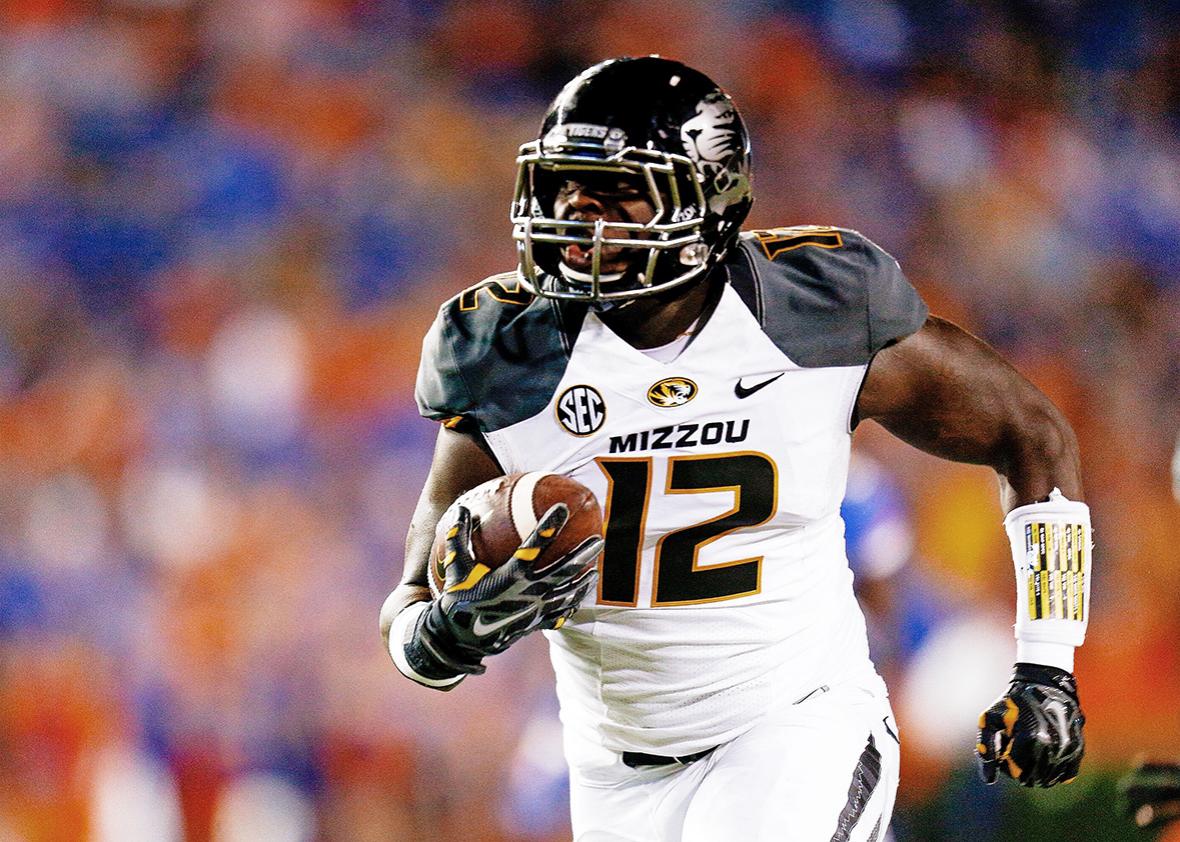The president of the University of Missouri resigned Monday morning, after weeks of student protests over acts of overt racism on campus, from racial slurs hurled at minority students to a swastika drawn in feces in a dorm bathroom. As early as Oct. 21, students called for President Tim Wolfe to step down for his listless handling of these incidents, and for presiding over an intolerant campus culture. Now they’ve gotten their wish—but only after their classmates on the school’s powerhouse football team got involved.
While there are many lessons to draw from Wolfe’s resignation, that one strikes me as particularly resonant: At universities like Mizzou, where football plays an outsized role in campus life and contributes an outsized haul to the school’s coffers, there is a massive power differential between student-athletes and tuition-paying students. The actions of the black football players who said they wouldn’t play until Wolfe was out—and the supportive words of their teammates and coach—are laudable. They shouldn’t have been needed.
Mizzou’s administration didn’t appear to listen when student-organized rallies began in September. Nor did it matter when faculty members announced they’d hold a two-day walkout if problems weren’t addressed. Nor did one student’s hunger strike beginning a week ago make a difference. After ignoring this uproar for weeks, the president buckled just two days after the football team threatened to boycott its next game.
Former Mizzou player Michael Sam summed up the dissonance succinctly while speaking with ESPN: “There was nobody here [Wednesday]. Two tents and a reporter,” he said. “Things change when sports gets involved.”
After Wolfe’s announcement, Jonathan Butler, the black graduate student who’d gone on a hunger strike, announced on Twitter that his strike was over, and the football team announced practice would resume on Tuesday. It is both upsetting and evidently true that the university cared more about the latter than the former. After all, had the team not played its game against Brigham Young University, Mizzou would have been forced to pay BYU a cool $1 million—more than twice the annual salary of the now-former university president.
Maybe college football players deserve a loud voice on campuses. As many have pointed out, they work what are essentially full-time, backbreaking jobs for no money. They enjoy none of the profits they bring to their schools, which for Mizzou amounts to millions of dollars annually. So why not at least use the power they do have—in this case, their collective voice—to speak out for other people?
But the point isn’t that football players should have less power; it’s that regular students—who often go thousands of dollars into debt to pay for their education—deserve more. Despite months of protest, how many Americans knew about the racial tensions simmering at Mizzou until the school’s football players got involved? Not many.
To be sure, the media needs to take our licks for that. We deserve some blame for ignoring the well-reasoned voices of hundreds of Mizzou students until the great American tradition of college ball got into the mix. But so does Mizzou.
Wolfe is a former software-industry exec who thought he could run a university like a business. This might explain the lack of empathy he displayed when students surrounded his car demanding answers, or when he told students the definition of “systematic oppression” was “when you don’t believe you have the equal opportunity for success.” It might also explain why money—in this case the millions of dollars Mizzou stood to lose—spoke so loudly, while student protests were rebuffed.
Across campuses nationwide, students find themselves paying thousands of dollars to attend universities that often refuse to accommodate their needs. Whether it’s first-generation students shouting into the wind for additional support, or broken sexual-assault–response mechanisms putting students at risk of physical harm, the voices of college students are too frequently disregarded. In no other industry are paying customers ignored so openly. That the obvious injustice of a toxic campus culture that tolerated racial harassment went uncorrected until football players got involved speaks volumes.
So there’s really just one lesson for students here: If you want your voices to be heard, you better get the football team on your side.
